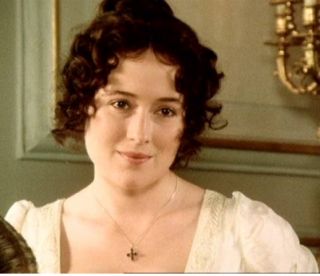
Fantasies
Entering Another's Experience
In fiction one can become someone other than oneself
Posted August 2, 2012

Jennifer Ehle as Elizabeth Bennet
Psychologists are familiar with the idea of perspective taking, knowing some aspect of what another person is thinking. Only recently have they started to investigate the idea of experience-taking: entering the experience of another.
Experience-taking, a term proposed Geoff Kaufman and Lisa Libby (2012), may be thought of as more radical than perspective taking. It's a kind of merging with another: not just thoughts and beliefs, but a state of being. Empathy is an example in day-to-day life. But yet larger effects, perhaps, occur in fiction when we identify with a literary character. So, although we remain ourselves we can become Anna in Anna Karenina or we can become Elizabeth in Pride and prejudice. Kaufman and Libby say that in experience-taking:
readers simulate the events of a narrative as though they were a particular character in the story world, adopting the character’s mindset and perspective as the story progresses rather than orienting themselves as an observer or evaluator of the character … the greater the ability of a reader to simulate the subjective experience of a character—the greater the potential that story has to change the reader’s self-concept, attitudes, and behavior. (p. 2).
Kaufman and Libby asked student participants to read a story in which the protagonist was a college student. The story gave the reader information about the protagonist's thoughts, actions, and feelings. The experiments were in two groups. In the first group, the focus was on how far readers thought of themselves as individuals, and the what the effect was of such individual consciousness on experience-taking. In their first experiment, Kaufman and Libby found that the more conscious readers were of their own individual experience, the less was their experience-taking as they read the story. In their second experiment Kaufman and Libby instructed half the readers to think of themselves simply as average students no matter what their background or major, whereas the other half of the readers did not receive this instruction. Those who read the average-student instruction showed more experience-taking when they read the story. In the third experiment readers were asked either to read the story in a cubicle that had a mirror in it, or to read the story in a cubicle without a mirror. Those who didn't have the mirror had higher scores on experience-taking.
The second group of studies involved manipulating the text of the story. In experiment 4, Kaufman and Libby used four versions of a story: so the participants read the story with either first-person or third-person narration, and with the protagonist being either at the same or a different university than that of the reader. The first-person story induced more experience-taking when the protagonist was at the same university as the reader. In their last two experiments, Kaufman and Libby compared earlier or later placement in the story of information that the protagonist was a member of a group to which the reader did not belong. In experiment 5, readers were heterosexual and the protagonist was homosexual and in experiment 6 readers were white and the protagonist was African-American. Later introduction of this information in the story increased experience-taking.
In experience taking, although in a sense we remain ourselves, we can also become the character about whom we read: the story-character's thoughts and feelings become our own. We might think that we have just one life to lead, but fiction enables us to lead many lives, and to experience being many kinds of person.
Jane Austen (1813). Pride and prejudice. London: Dent (current edition, 1906).
Geoff Kaufman & Lisa Libby (2012). Changing beliefs and behavior through experience-taking. Journal of Personality and Social Psychology, 103, 1-19.
Leo Tolstoy (1877). Anna Karenina (R. Pevear & L. Volokonsky, Trans.). London: Penguin (Translation, 2000).
Image: Jennifer Ehle as Elizabeth Bennet in the BBC version of Pride and prejudice.

